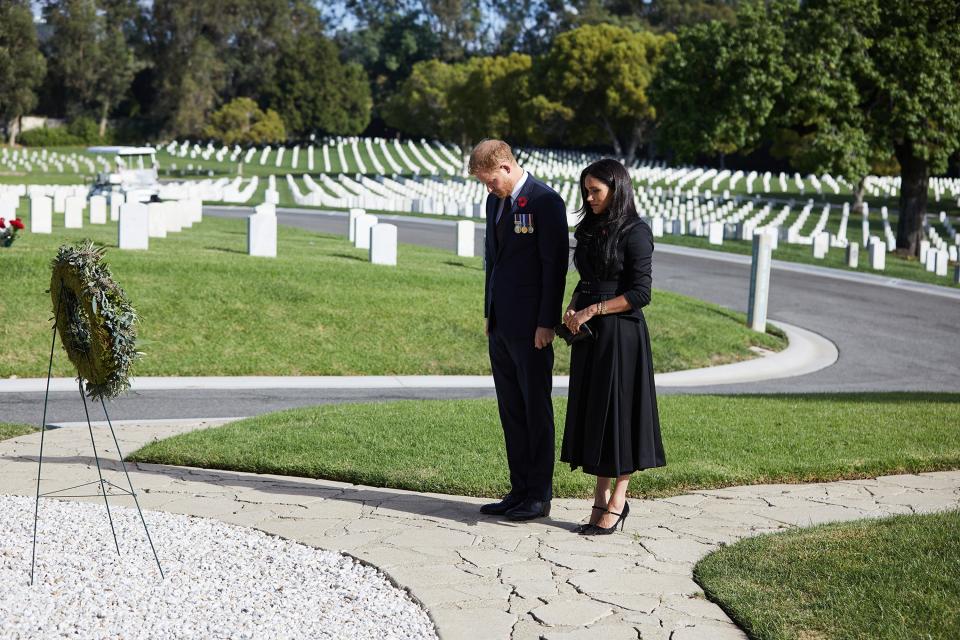Prince Harry blames social media for 'avalanche of misinformation,' attack on U.S. Capitol
They've not been heard from since insurrectionists attacked the U.S. Capitol on Jan. 6, but British citizen Prince Harry and his American wife, Duchess Meghan of Sussex, were paying close attention. Now Harry is pointing out those he thinks are responsible: social media and the purveyors of lies who flourish there.
Harry spoke in a lengthy interview published Friday in business magazine Fast Company, where he laid out his views about the need to defeat racism and how the digital landscape helps spread hate and toxicity in public debate.
Now he's making even more pointed arguments that social media platforms have helped spread "an avalanche of misinformation" and "a barrage of mistruths" that have trapped families in dark conspiracy theories and threatened democracy with violence and death.
The effort to reform tech platforms has become a major focus of Harry and Meghan's newly launched Archewell Foundation, including funding research to study its impact on people. The Capitol attack, which was conceived, planned and promoted online with help from an inflammatory speech by outgoing President Donald Trump, only underscored the dangers, in Harry's view.
"The avalanche of misinformation we are all inundated with is bending reality and has created this distorted filter that affects our ability to think clearly or even understand the world around us," Harry said in the interview.
He said he sees this as a humanitarian issue, and everyone is vulnerable.
"What happens online does not stay online – it spreads everywhere, like wildfire: Into our homes and workplaces, into the streets, into our minds. The question really becomes about what to do when news and information sharing is no longer a decent, truthful exchange, but rather an exchange of weaponry," he said.
Social media companies have to step up and take responsibility, he said. And that includes the shocking mob attack on the Capitol, which left five people dead, hundreds injured or arrested, the hallowed halls trashed, and millions of Americans outraged by the rioters' ability to overcome security and target lawmakers for kidnapping and execution. Much of all this was documented and posted online by the rioters themselves.
"We have seen time and again what happens when the real-world cost of misinformation is disregarded," Harry argued. "There is no way to downplay this. There was a literal attack on democracy in the United States, organized on social media, which is an issue of violent extremism."
There has to be accountability, he said, "to collective wellbeing, not just financial incentive. It’s hard for me to understand how the platforms themselves can eagerly take profit but shun responsibility."
Harry said he's been thinking fondly of Speakers' Corner in London's Hyde Park, the longstanding site for public speeches, protests and demonstrations since the mid-19th century. Harry said he used to pass this lively spot for public debate all the time.

"I’m not saying we should abandon technology in favor of Speakers’ Corner," he said. "Rather, it’s that we should avoid buying into the idea that social media is the ultimate modern-day public square and that any attempt to ask platforms to be accountable to the landscape they’ve created is an attack or restriction of speech."
As a foreign-born resident of the U.S. (they now live in Santa Barbara County, California), Harry, 36, could not vote in the Nov. 3 presidential election, but Meghan, 39, did, becoming the first member of the British royal family to do so.
Once they arrived in California in March 2020 with baby son Archie, both of them began speaking out about issues they care about, some of which are also the subject of political debate, in ways that would not have been possible were they still working senior royals living in a palace in Britain.
Harry's alarm about the harms of social media has grown in recent years after what he and Meghan considered racist and intrusive coverage in the British media, one of the reasons they cited a year ago when they announced they were stepping back from royal duties and moving to America in search of more independence and privacy.
Harry cited a recent example of what he considers untruthful coverage, when the couple woke up one morning a few weeks ago to learn that The Sunday Times of London, owned by media mogul Rupert Murdoch, reported the duo were "quitting" social media.
"That was ‘news’ to us, bearing in mind we have no social media to quit, nor have we for the past 10 months," Harry said.
"We will revisit social media when it feels right for us – perhaps when we see more meaningful commitments to change or reform – but right now we’ve thrown much of our energy into learning about this space and how we can help."
.
This article originally appeared on USA TODAY: Prince Harry blames social media for attack on U.S. Capitol, democracy

 Yahoo Finance
Yahoo Finance 